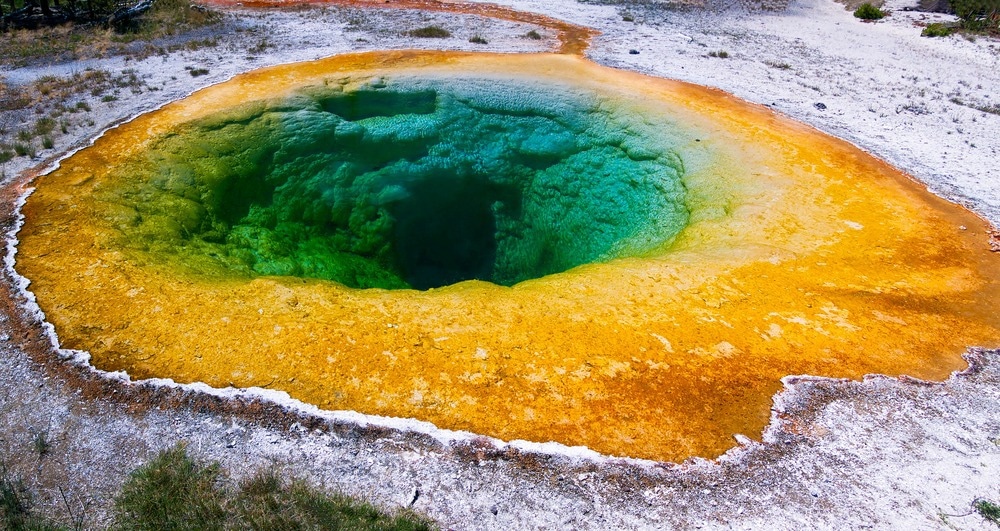An extremophile is an organism that thrives in extreme environmental conditions. MacElroy introduced the term in 1974. Extremophiles, particularly microorganisms, have garnered significant interest for their potential in biotechnological and biomedical fields. They generate bioactive compounds such as antibiotics, antioxidants, and cytotoxic agents, which have various applications in medicine, agriculture, industry, and environmental cleanup. However, bioprospecting for beneficial products from extremophiles must adhere to ethical guidelines to minimize potential environmental consequences.

Image Credit: Kenneth Keifer/Shuttertstock.com
In the search for novel bioactive substances such as antimicrobial and anticancer agents, researchers are increasingly focusing on extremophiles that inhabit harsh environments like permafrost, hydrothermal vents, hot springs, and soda lakes.
These organisms can endure extreme temperatures, water activity, salt levels, pH, oxygen concentration, and pressure. The study and utilization of these bioactive compounds from extremophiles is known as bioprospecting, which holds great promise for biotechnology and medicine.
One notable example is ectoine, derived from organisms in high-salinity environments, widely used in skin care products. Extremophiles exhibit unique adaptations, including temperature extremes (-2°C to 20 °C or 55 °C to 121 °C), salt tolerance (2-5 Molar), and pH stability (above 8 or below 4), enabling them to survive in harsh conditions. By leveraging these traits, new pathways can be created for innovative solutions to pressing biotechnological and biomedical challenges.

Image Credit: Himedia Laboratories Private Limited
One of the most exciting applications of extremophiles is in medicine. These microorganisms produce bioactive compounds with anticancer, antibacterial, antifungal, and antiviral properties. For example, certain extremophiles from deep-sea hydrothermal vents yield enzymes with significant activity at elevated temperatures, making them valuable tools in molecular biology.
Antibiotics such as penicillatide B and fusaperazine F from extremophiles have shown efficacy against drug-resistant pathogens such as methicillin-resistant Staphylococcus aureus, offering promising solutions to multidrug-resistant infections.
By cloning genes from extremophiles involved in stress responses, scientists can create genetically modified crops with enhanced resilience to environmental stresses like drought and salinity. For instance, the H(+)-pyrophosphatase gene from Thellungiella halophila has been successfully cloned and expressed in tobacco plants to improve salt tolerance. This approach can enhance crop productivity through the stress response mechanisms of extremophiles.
Sustainable biofertilizers derived from extremophiles can enhance soil fertility and nutrient absorption in crops, as seen with the growth-promoting effects of Arthrospira platensis on papaya and petunia.
Enzymes sourced from extremophiles present numerous opportunities in the food, textile, and beverage industries. Extremophilic enzymes, such as lipases and proteases, are utilized in detergents due to their effectiveness under extreme pH and temperature conditions, leading to efficient and eco-friendly cleaning solutions.
These enzymes also enhance aroma and flavor in food processing. Glucosidases from extremophiles have been shown to improve the aroma of wine and fruit juices. Moreover, extremophiles are being investigated for their bioremediation potential, which involves using living organisms to decontaminate polluted sites. Certain extremophiles can metabolize toxic substances and flourish in contaminated environments, aiding in the restoration of ecosystems.
Despite their vast potential, the exploration of extremophiles raises ethical and conservation concerns due to their delicate habitats. Implementing strict ethical standards and sustainable practices during bioprospecting efforts is crucial.
Irresponsible practices, such as disregarding regulations and the rights of local communities or overexploiting natural resources, can severely disrupt and damage ecosystems.
A prime example is the Rose Garden hydrothermal vent, where repeated disturbances have led to the loss of original species and the emergence of new lava formations and fauna.
Bioprospecting extremophiles represents a promising frontier for scientific discovery and technological advancement. By balancing scientific exploration with environmental stewardship, we can unlock the full potential of extremophiles while ensuring sustainability.
References
- de Rojas, C. (2022) Marine bioprospecting: an underwater world of opportunity. Insciter, 7 March. Available at: https://insciter.com/2022/03/07/marine-bioprospecting-an-underwater-world-of-opportunity/ .
- https://ars .els-cdn.com/content/ image/1-s2.0-S2666517422000311-gr1_lrg.jpg
- Frontiers Media S.A. (2020). Available at: https://www.frontiersin.org/files/Articles/447668/fmicb-10-00780-HTML-r2/image_m/fmicb-10-00780-g001.jpg.
- InterRidge. (2023). InterRidge - InterRidge. (online) Available at: https://www.interridge.org/.
About Himedia Laboratories Private Limited
With a presence in more than 150 countries, HiMedia is amongst the top three brands in the Bioscience Industry.
HiMedia Laboratories Private Limited is world renowned for manufacturing high quality culture media for microbiology. Additionally, we provide advanced media and products in the fields of Molecular Biology, Cell Biology, Plant Tissue Culture, Chemicals and Lab Aids/Equipment. As a Top Tier Global player, we are not only dedicated towards products but also striven towards introducing technologies such as Genomics Sequencing Services and Hydroponics.
HiMedia has managed to do this over decades as we have our own in-house bulk raw materials manufacturing plant. This enables us to deliver consistent quality products that conform to ISO 9001:2015 and ISO 13485:2012 and WHO: GMP.
HiMedia Labs. caters to one of the broadest Biosciences product categories: our premier established line of Microbiology products and newer promising products in Molecular Biology, Automated and Molecular Instruments, Cell Biology, Chemicals, and Premium Grade Lab Consumables, amongst others. The COVID-19 pandemic revolutionized not the clinical industry’s thought process regarding the significance of Molecular Diagnostics products.
The ‘Molecular Biology and Virology Division’ of HiMedia Laboratories Pvt. Ltd. Also called as HiGenoMB® is a One Stop Solution Provider churning out potential Research and Industry oriented Molecular biology products for the past glorious decade. About 2000 different products such as Nucleic Acid Extraction and Amplification (PCR) Kits, Cloning Reagents, Buffers & Chemicals for proteomics studies, Automated Molecular Instrumentation including RT PCR machines and PCR thermal cyclers and DNA/RNA Extraction platforms are being produced. The Proficient researchers in this department are spear heading the challenging field of Molecular Diagnostics to provide a complete solution for clinical diagnosis, agriculture, veterinary sciences, food industry, drug discovery and forensic medicine with the use of Real Time PCR or quantitative PCR kits and thermal cyclers. Our Molecular Biology Division-has established an in-house Advanced Sequencing and Bioinformatics facility which marks HiMedia’s entry into the Services space.
Our Cell Biology segment contributes with technologies which have brought in Serum free media for biopharma applications, Viral Vaccine Production Platform, Multicompendial grade chemicals, cultivated meat, and 3D bioprinting.
Moving from conventional to advanced automated methods like MALDI-TOF (Autof MS 1000) has been our newest endeavour for Microbiology.
Sponsored Content Policy: News-Medical.net publishes articles and related content that may be derived from sources where we have existing commercial relationships, provided such content adds value to the core editorial ethos of News-Medical.Net which is to educate and inform site visitors interested in medical research, science, medical devices and treatments.